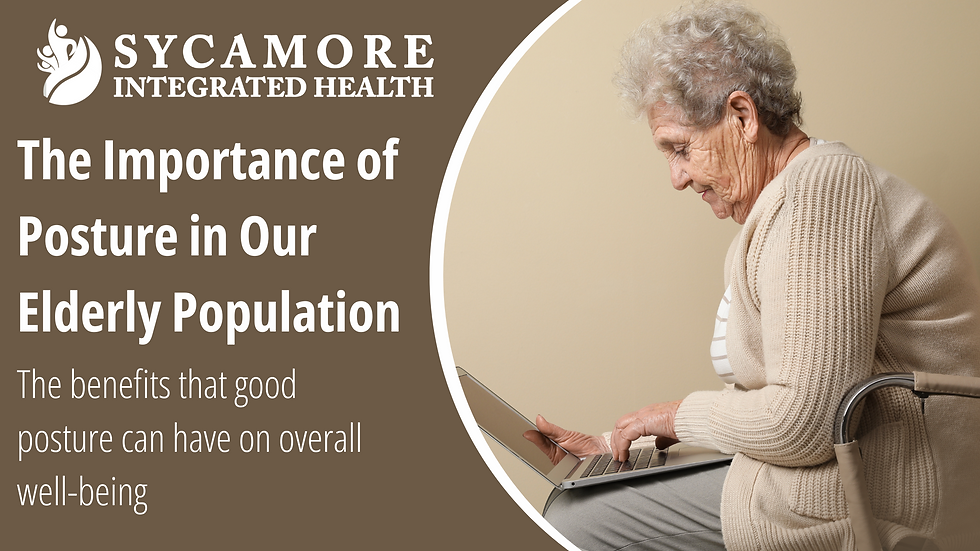Effects of Stress on Weightloss
- Sycamore Integrated Health

- Apr 2
- 3 min read

How Stress Can Impact Your Weight Loss Journey
Stress is one of the hidden factors that can prevent weight loss progress. It's not just about eating well or exercising—it’s about how your body responds to stress. If you’re dealing with chronic stress, it can be harder to achieve your weight loss goals, even if you’re doing everything "right."
Stress can affect weight in a variety of ways, both through physiological changes and behavioral responses. Here's a list of how stress might influence body weight:
Increased Cortisol Levels:
Chronic stress increases the production of cortisol, a hormone that can promote fat storage, especially around the abdominal area. This can lead to weight gain.
Emotional Eating:
Stress can trigger emotional eating or "stress eating," where people may turn to food, often unhealthy comfort foods (high in sugar, fat, or salt), as a coping mechanism. This leads to overeating and weight gain.
Altered Appetite:
Stress can cause a loss of appetite for some individuals, leading to weight loss due to a reduced intake of calories.
Increased Cravings for High-Calorie Foods:
Stress can lead to cravings for high-calorie, sugary, or fatty foods, which can contribute to overeating and weight gain.
Disrupted Sleep Patterns:
Stress can affect sleep quality, leading to poor or insufficient sleep, which is linked to weight gain. Lack of sleep can increase hunger hormones like ghrelin, promoting overeating.
Metabolic Changes:
Chronic stress can influence metabolism, sometimes slowing it down, which makes it easier to gain weight or harder to lose weight.
Muscle Loss Due to Stress-Induced Catabolism:
Extended periods of stress can lead to muscle breakdown (catabolism), which may lower metabolic rate and contribute to weight gain due to a lower muscle-to-fat ratio.
Increased Fat Storage:
Stress can lead to an increase in fat storage, especially around the abdomen (visceral fat), due to higher cortisol levels, which may increase the risk of obesity-related diseases.
Exercise Disruption:
High-stress levels can lead to a lack of motivation to exercise, leading to reduced physical activity, which can contribute to weight gain.
Digestive Issues:
Stress can cause digestive problems such as bloating, constipation, or diarrhea, potentially affecting appetite and digestion, which may contribute to weight changes (either loss or gain).
Cravings for Caffeine and Alcohol:
In an attempt to cope with stress, people might increase their intake of caffeine or alcohol, both of which can disrupt sleep, alter appetite, and contribute to weight changes.
Impact on Insulin Sensitivity:
Chronic stress can affect insulin sensitivity, leading to insulin resistance, which can contribute to weight gain, particularly around the abdominal area.
The impact of stress on weight can vary between individuals and depend on the type and duration of stress. Some people may lose weight, while others may gain weight.
________________________________________________________________________________
Managing Stress and Lowering Cortisol Levels
The good news is that there are several ways to reduce stress and manage cortisol levels to support your weight loss journey. Here are a few strategies:
Practice Stress Management
Deep breathing or meditation can help activate the relaxation response.
Taking regular breaks during the day to unwind and relax is crucial.
Find activities that bring you joy, like reading, listening to music, or taking a walk.
Prioritize Sleep
Aim for 7-9 hours of quality sleep each night. This will help regulate cortisol levels and allow your body to recover and restore its hormonal balance.
Exercise in Balance
Exercise helps reduce stress, but too much can increase cortisol. Aim for moderate-intensity exercise, mixing it with low-intensity activities like walking or yoga to avoid overstressing your body.
Eat to Support Hormonal Balance
Choose whole, nutrient-dense foods like vegetables, fruits, and lean proteins.
Include healthy fats (e.g., avocado, nuts) and complex carbs (e.g., whole grains, vegetables) to help keep cortisol in check.
Minimize excess caffeine and sugar, as they can spike cortisol levels.
Practice Mindful Eating
When stressed, it's easy to turn to comfort foods. By practicing mindful eating, where you eat slowly and pay attention to how food makes you feel, you can avoid emotional eating and stay on track with your goals.
Final Thoughts
Managing stress and balancing cortisol levels are as crucial as your nutrition and exercise efforts. By discovering methods to reduce stress and maintain hormonal balance, you’ll facilitate your body's ability to lose weight and feel great.




Comments